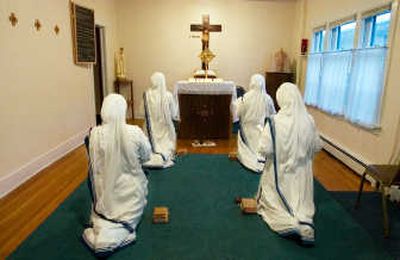More Americans leaving religious ties of their youth

America has always been a competitive religious marketplace, but a major survey released Monday shows a country increasingly exploring different faith identities and ways of worship. More than 40 percent of respondents told pollsters that they had changed their religious affiliation since childhood.
Experts say the growth of religious minorities, American mobility and intermarriage are key factors in the churn documented in the Religious Landscape Survey, one of the largest such polls ever done, with 35,000 adults interviewed.
Conducted by the Pew Forum on Religion and Public Life, the survey confirms on a grand scale trends that demographers have noted for years: the slipping percentage of Protestants, now down to 51, and the rise of people who call themselves unaffiliated, now at 16 percent, up from similar surveys.
The survey also lays out, just weeks before Pope Benedict XVI’s first papal visit to the United States, the Catholic Church’s challenge here: No American faith group has lost more adherents. Among U.S. adults, about the same percentage – 24 – call themselves Catholic as in the past, but that statistic masks significant turnover. The percentage has held up primarily because of the huge number of recent Latino immigrants, who are largely Catholic, the survey found. Sixty-eight percent of people raised Catholic still identify with their childhood denomination, compared with 80 percent of Protestants and 76 percent of Jews.
Millions of dollars are being pumped into such research as religious institutions – like hospitals, universities and social service organizations – watch Americans increasingly dismiss the importance of denomination, long a key societal organizer. Old barometers of religiosity such as church membership are becoming less important as Americans craft a more bottom-up, individualized concept of faith. The new landscape has nondenominational megachurches, worship services in movie theaters, Episcopalians speaking in tongues and independent rabbinical schools.
“When it comes to religion, there is believing, belonging and behaving, and they don’t always correlate,” said Barry Kosmin, a co-author of the 2001 American Religious Identification Survey, which polled 50,000 people but asked fewer questions than the new Pew poll.
Pew’s survey also includes a basic sketch of each state’s religious profile. For example, compared with national percentages, Virginia has relatively more white evangelicals and fewer Catholics.
The survey is likely to feed the debate raging among scholars about what is happening in American religion. Some think that secularism is underreported as people may check a box correlating to a faith group without actually believing its tenets or following its practices. Others think the growth of the unaffiliated (sometimes called “religious nones,” because they check “none” when asked their faith on polls) disguises the number of people who consider themselves “spiritual but not religious.”
Tom Smith, director of a major sociological survey at the University of Chicago, estimated that 25 percent of U.S. adults think of themselves as spiritual but not religious. “Some trends show there is less support for organized religion but either a steady or, by some measures, rising support for personal religious beliefs,” Smith said.
Some Catholic researchers played down the survey’s finding that about 10 percent of U.S. adults are former Catholics and said that the church has always been significantly impacted by immigration. They also said the church’s membership has increased by about 20 million since 1965.
Mary Gautier, a sociologist at Georgetown’s Center for Applied Research in the Apostolate, said Catholics are more likely than members of other denominations to say they “left” their faith because the bar of being a “practicing Catholic” is high.
“They feel guilty,” she said. “If you’re a Methodist and you only go to church occasionally, you don’t consider yourself no longer practicing, but Catholics tend to do that.”
But Oscar Mendez, who coordinates charismatic renewal for the Arlington (Va.) Diocese, said he sees evidence of Catholics leaving, particularly for Protestant denominations. According to Pew, one in 10 Protestants was raised Catholic. Too many Catholics, Mendez said, fall back on the label but don’t engage with the church and don’t have a “mature” faith. Protestants, he said, have been better at creating conditions for people to “have an experience” with Jesus.
More than anything else in the poll, Pew highlighted the fluidity of identity, noting that faith groups constantly gain and lose members. Twenty-eight percent of Americans have left the group they were raised in, switching, for example, from Protestantism to Judaism or from the Orthodox faith to Catholicism. When people who have switched from one Protestant denomination to another are included, the number jumps to 44 percent.
America has always been very religiously vibrant, said Pew political scientist John Green, but today there are more options, more “things you can move from and to.”
Fred Kurth, a retired aerospace engineer, was married at Fifth Avenue Presbyterian Church in Manhattan. He later became a Unitarian Universalist and led several congregations as he moved around the world with General Electric. After meeting his second wife in Morocco, he had to face a hard choice: convert to Islam or forgo marrying her.
“I was soul-searching. I had to answer, How far is it? If I’m a Unitarian, I believe there is a direct link between me and God, and no third party to go through, how different is that from Islam?”
Today Kurth, who took the name Ibrahim, prays every day at the mosque near his home in Fredericksburg, Va., and carries a prayer rug in his car.
The group that has grown the most is made up of those who are unaffiliated, including people who call themselves atheist and agnostic. Also included in this group are those who said they are “nothing in particular” – some of whom went on to say religion is “very important” to them. Seven percent of survey respondents said they were raised as unaffiliated, less than half the percentage who call themselves unaffiliated today.